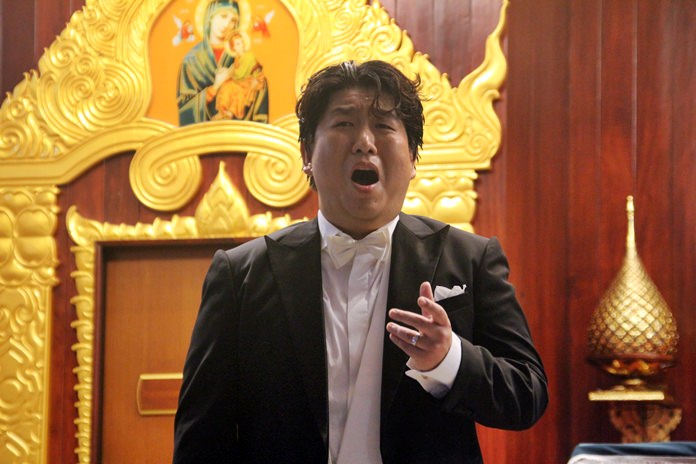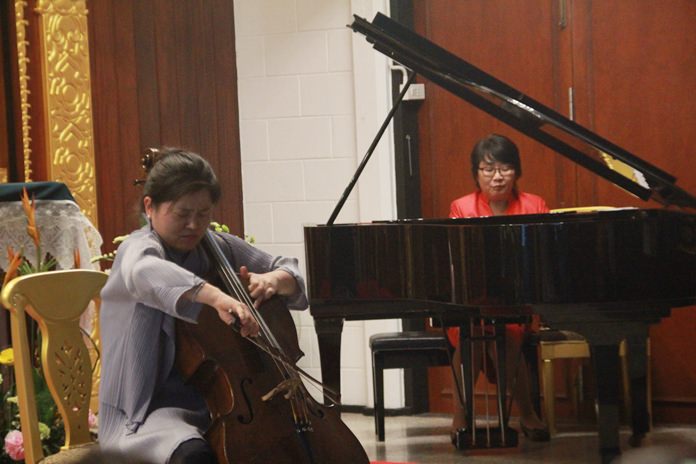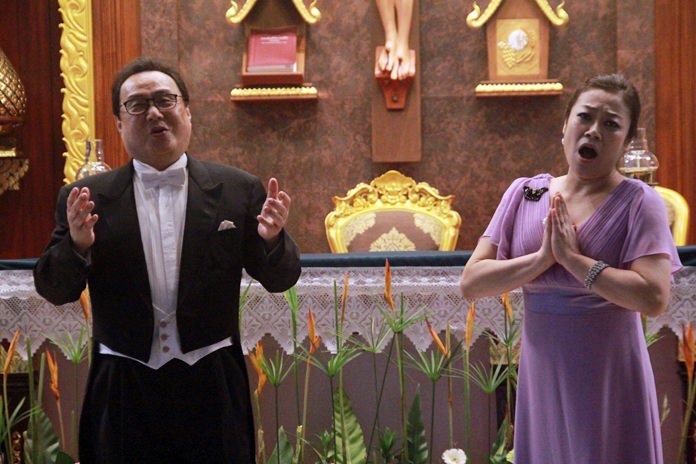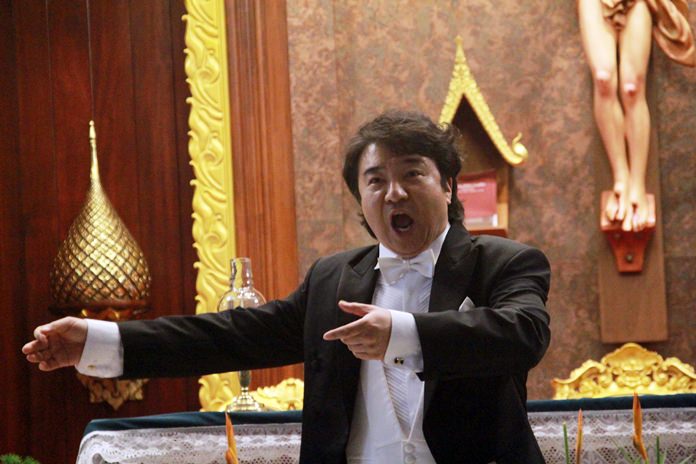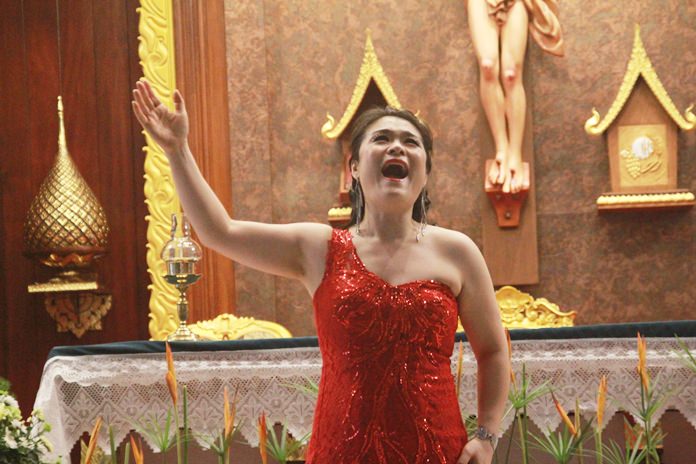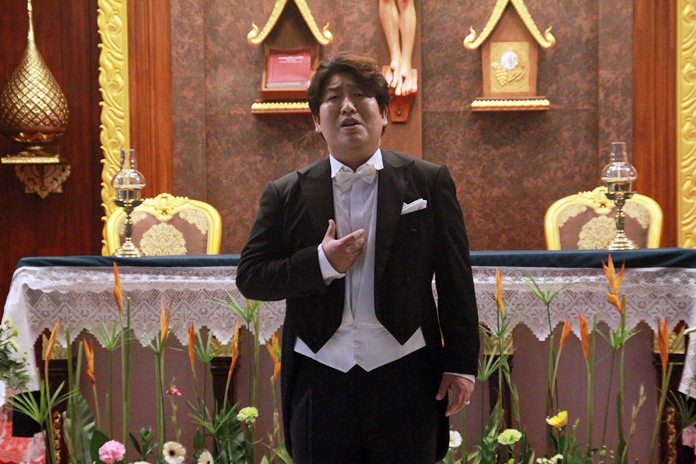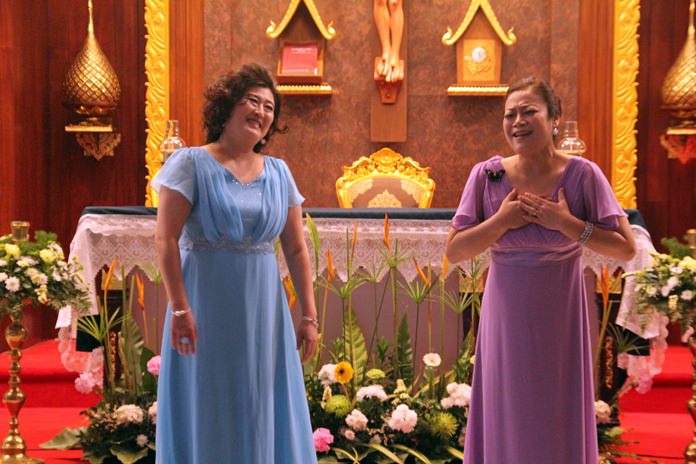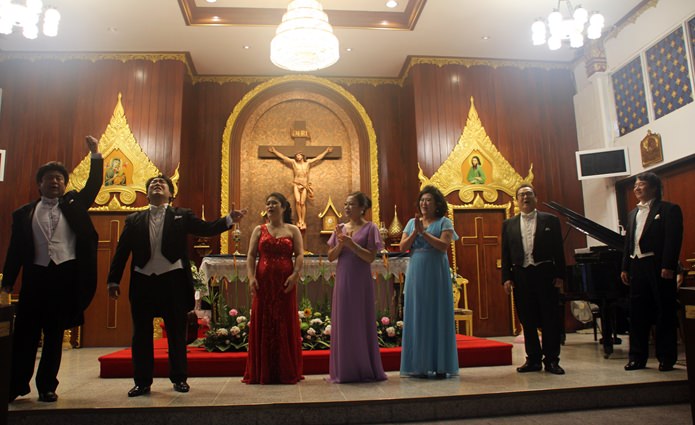
From the first few notes, it was obvious that the large audience at St. Nikolaus church was in for a special musical treat. After an introduction by Kim Schnyder of Casa Pascal Restaurant, members of the Kwangju Opera Company from Korea opened their concert with a twentieth century classic, The Stein Song. It was originally the school song of the University of Maine, written in 1902 and based on a march by E. A. Fenstad. The singers gave a stunning performance and their powerful sound and rich tone quality thrilled the audience, which responded with whoops of delight. And this was just the opening number.
 The concert, which was supported by Casa Pascal Restaurant, Saint Nikolaus Church, Pattaya Mail, Der Farang and Vanichwathana (Bangkok) Co., Ltd., included several operatic works as well as other songs in several different languages. The second item was the once-popular Que Sera, Sera which was not written by someone called “D. Day” as the programme claimed, but by the songwriting team of Jay Livingston and Ray Evans. Even so, it was given a lilting and sensitive performance by Jinhee Kim (soprano) and Eunjung Shin (mezzo-soprano). Eunjung Shin has a strong and commanding voice and she gave a compelling performance of Vincenzo di Chiara’s song La Spagnola. The Spanish theme was continued by tenor Kyunam Ko who sang the song Granada by Agustín Lara who, contrary to popular belief was not Spanish but Mexican. Kyunam Ko gave an excellent performance with clear diction and a fine sense of contrast.
The concert, which was supported by Casa Pascal Restaurant, Saint Nikolaus Church, Pattaya Mail, Der Farang and Vanichwathana (Bangkok) Co., Ltd., included several operatic works as well as other songs in several different languages. The second item was the once-popular Que Sera, Sera which was not written by someone called “D. Day” as the programme claimed, but by the songwriting team of Jay Livingston and Ray Evans. Even so, it was given a lilting and sensitive performance by Jinhee Kim (soprano) and Eunjung Shin (mezzo-soprano). Eunjung Shin has a strong and commanding voice and she gave a compelling performance of Vincenzo di Chiara’s song La Spagnola. The Spanish theme was continued by tenor Kyunam Ko who sang the song Granada by Agustín Lara who, contrary to popular belief was not Spanish but Mexican. Kyunam Ko gave an excellent performance with clear diction and a fine sense of contrast.
Sungjin Hong (baritone) made a surprising and dramatic entrance from the back of the church to sing the well-known Chanson du Toreador from Bizet’s 1875 opera, Carmen. He has a powerful voice and a commanding stage presence and he gave a lively performance of the song, encouraging the audience to clap along to the infectious march-like music. Which, of course, they did.
Jinhee Kim (soprano) and Haechul Lim (bass) sang a duet from Mozart’s The Magic Flute. It was the entertaining Papageno-Papagena duet, the lyrics of which begin with the syllable “pa” sung forty-seven times. It was performed with excellent articulation and sense of ensemble. Tenor Hontae Lim sang La donna è mobile from Verdi’s opera Rigoletto, giving a compelling performance in which his soft vocal tone in the quieter passages was impressive. Jinhee Kim (soprano) demonstrated excellent stage presence and vocal projection in the song I Feel Pretty from Bernstein’s musical West Side Story, and Francesco Tosti’s song L’ultima Canzone was a perfect vehicle to display Haechul Lim’s fine vocal control and resonant bass tone quality. Hongtae Kim (tenor) and Sungjin Hong (baritone) gave a beautifully compelling performance of the nostalgic duet O Mimì, tu più non torni from Puccini’s opera La Bohème.
What most impressed me about the recital was the excellence of the singers. Intonation, tone quality and diction were spot-on in pretty well everything which is not really surprising because all seven singers from the Kwangju Opera Company are highly experienced performers and several of them have won international prizes. They all hold prestigious teaching appointments at Korean universities. I was also delighted with the superb and confident piano accompaniments provided by Jihyun Park. She really supported the singers throughout, using the fine Yamaha grand piano that had been specially obtained for occasion by Casa Pascal Restaurant. Jihyun Park’s accompaniments were intensely rhythmic and caught the essential moods of the varied music.
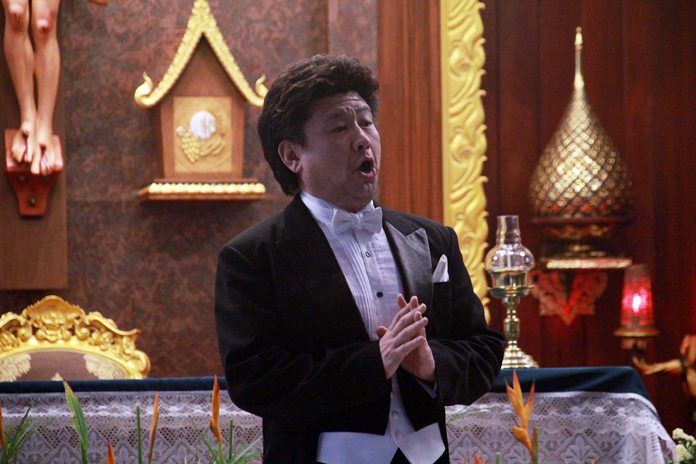
The singers were later joined by the well-known pianist Yeon-kyo Kim and cellist Yuscha Kim. Their first item was the popular and well-known American patriotic song The Battle Hymn of the Republic. The tune is also known as Mine Eyes Have Seen the Glory, John Brown’s Body and Glory! Glory! Hallelujah. Pianist Yeon-kyo Kim is the winner of various international awards and she provided a virtuosic improvised accompaniment while the cello played the melody.
The second piece was the so-called Emperor’s Hymn by Joseph Haydn. It was originally intended as an anthem to Francis II, Emperor of the Holy Roman Empire but it has since been widely used in other contexts, as well as being the national anthem of Germany. Cellist Yuscha Kim played the melody beautifully, even more remarkable in that she was using a borrowed cello. Yuscha Kim concluded her recital with an instrumental version of The Lord’s Prayer, originally a song written in 1935 by the prolific American composer Albert Hay Malotte. It was a lovely performance with perfect intonation, careful phrasing and beautiful tone quality.
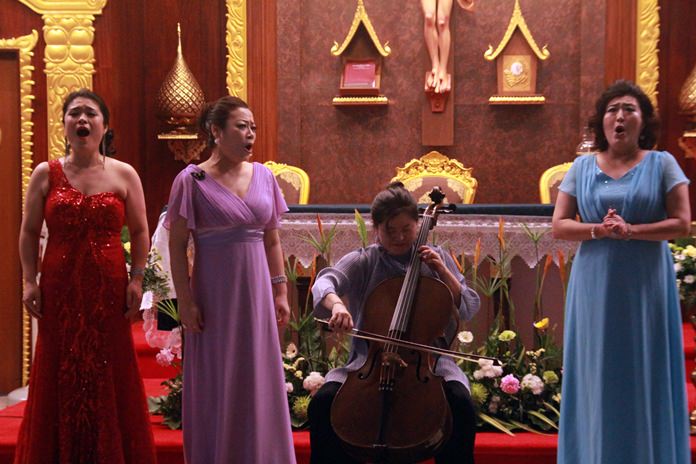
The main part of the concert ended with a striking and superbly confident ensemble performance of the Korean folksong Kyeongbokkung Taryeong with its characteristic catchy rhythms. The standing ovation resulted in a performance of the famous Puccini aria Nessun dorma, performed by the two tenors and joined by the full ensemble. It was a moving moment and the musical climax was astounding in both its volume and majestic tone quality. The audience begged for more and the singers obliged with lively singing of the ever-popular Neapolitan songs O sole mio and Funiculì, Funiculà bringing the concert to a triumphant conclusion. They brought the house down. Incidentally, Funiculì, Funiculà was composed in 1880 to commemorate the opening of the first funicular cable car on Mount Vesuvius. Not many people know that.
